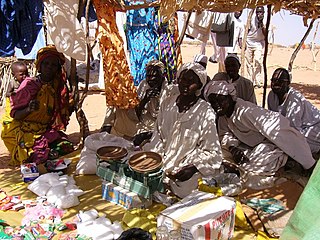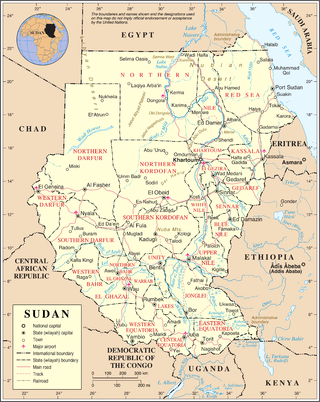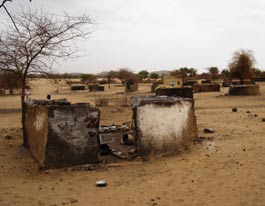
The African Union Mission in Sudan (AMIS) was an African Union (AU) peacekeeping force operating primarily in the country's western region of Darfur to perform peacekeeping operations related to the Darfur conflict. It was founded in 2004, with a force of 150 troops. By mid-2005, its numbers were increased to about 7,000. Under United Nations Security Council Resolution 1564, AMIS was to "closely and continuously liaise and coordinate ... at all levels" its work with the United Nations Mission in Sudan (UNMIS). AMIS was the only external military force in Sudan's Darfur region until UNAMID was established. It was not able to effectively contain the violence in Darfur. A more sizable, better equipped UN peacekeeping force was originally proposed for September 2006, but due to Sudanese government opposition, it was not implemented at that time. AMIS' mandate was extended repeatedly throughout 2006, while the situation in Darfur continued to escalate, until AMIS was replaced by UNAMID on 31 December 2007.

United Nations Security Council Resolution 1564, adopted on 18 September 2004, after recalling resolutions 1502 (2003), 1547 (2004) and 1556 (2004), the Council threatened the imposition of sanctions against Sudan if it failed to comply with its obligations on Darfur, and an international inquiry was established to investigate violations of human rights in the region.

United Nations Security Council Resolution 1672, adopted on April 25, 2006, after recalling resolutions 1556 (2004), 1591 (2005), 1651 (2005) and 1665 (2006) on the situation in Sudan, the Council imposed travel and financial sanctions on four Sudanese individuals over their involvement in the Darfur conflict. It was the first time sanctions had been adopted against individuals in the region.

United Nations Security Council resolution 1591, adopted on 29 March 2005, after recalling resolutions 1547 (2004), 1556 (2004), 1564 (2004), 1574 (2004), 1585 (2005), 1588 (2005) and 1590 (2005) on the situation in Sudan, the council placed a travel ban and asset freeze on those "impeding the peace process" in Darfur.

United Nations Security Council Resolution 1706, adopted on August 31, 2006, after recalling previous resolutions on the situation in Sudan, including resolutions 1556 (2004), 1564 (2005), 1574 (2004), 1590 (2004), 1591 (2005), 1593 (2004), 1663 (2006), 1665 (2006) and 1679 (2006), the Council expanded the mandate of the United Nations Mission in the Sudan (UNMIS) to include deployments in Darfur to enforce the Darfur Peace Agreement.

United Nations Security Council Resolution 1593, adopted on 31 March 2005, after receiving a report by the International Commission of Inquiry on Darfur, the Council referred the situation in the Darfur region of Sudan to the International Criminal Court (ICC) and required Sudan to co-operate fully. It marked the first time the council had referred a situation to the court, and also compelled a country to co-operate with it.

United Nations Security Council Resolution 1769, adopted unanimously on July 31, 2007, after reaffirming all resolutions on the situation in Sudan, the Council established the joint African Union – United Nations Hybrid Operation in Darfur (UNAMID) in an attempt to end the violence in Darfur, for an initial period of twelve months.

United Nations Security Council resolution 1547, adopted unanimously on 11 June 2004, after welcoming the commitment of the Sudanese government and Sudan People's Liberation Army/Movement (SPLA/M) to work towards a full ceasefire and peace agreement to end the Second Sudanese Civil War, the council established a United Nations Advance Team in Sudan to prepare for a future United Nations operation following the signing of the Comprehensive Peace Agreement. The brief reference to the situation in the Darfur region divided Council members, with Algeria, China and Pakistan against a mention of Darfur and the other two-thirds of the council supporting its inclusion.

United Nations Security Council Resolution 1945, adopted on October 14, 2010, after recalling previous resolutions on the situation in Sudan, the Council extended the mandate of an expert panel monitoring an arms embargo and other sanctions on groups that "impede peace in Sudan" until October 19, 2011.

United Nations Security Council resolution 1556, adopted on 30 July 2004, after recalling resolutions 1502 (2003) and 1547 (2004) on the situation in Sudan, the council demanded that the Sudanese government disarm the Janjaweed militia and bring to justice those who had committed violations of human rights and international humanitarian law in Darfur.

United Nations Security Council Resolution 1574, adopted unanimously at a meeting in Nairobi, Kenya, on 19 November 2004, after recalling resolutions 1547 (2004), 1556 (2004) and 1564 (2004), the council welcomed political efforts to resolve the conflicts in Sudan and reiterated its readiness to establish a mission to support the implementation of a Comprehensive Peace Agreement.

United Nations Security Council Resolution 1590, adopted unanimously on 24 March 2005, after recalling resolutions 1547 (2004), 1556 (2004), 1564 (2004), 1574 (2004), 1585 (2005) and 1588 (2005) on the situation in Sudan, the Council established the United Nations Mission in Sudan (UNMIS) for an initial period of six months.

United Nations Security Council resolution 1627, adopted unanimously on 23 September 2005, after recalling previous resolutions on the situation in Sudan, particularly Resolution 1590 (2005), the Council extended the mandate of the United Nations Mission in Sudan (UNMIS) for six months until 24 March 2006.

United Nations Security Council Resolution 1651, adopted unanimously on 21 December 2005, after recalling previous resolutions on the situation in Sudan, particularly resolutions 1556 (2004) and 1591 (2005), the Council extended the mandate of an expert panel monitoring sanctions against and violations of human rights in the Darfur region until 29 March 2006. It was the last Security Council resolution adopted in 2005.

United Nations Security Council Resolution 1663, adopted unanimously on March 24, 2006, after recalling previous resolutions on the situation in Sudan, particularly 1627 (2005) and 1653 (2006), the Council extended the mandate of the United Nations Mission in Sudan (UNMIS) for six months until September 24, 2006.

United Nations Security Council Resolution 1665, adopted unanimously on March 29, 2006, after recalling previous resolutions on the situation in Sudan, particularly resolutions 1556 (2004), 1591 (2005) and 1651 (2005), extended the mandate of an expert panel monitoring sanctions against and violations of human rights in the Darfur region until September 29, 2006.

United Nations Security Council Resolution 1709, adopted unanimously on September 22, 2006, after recalling previous resolutions on the situation in Sudan, particularly resolutions 1590 (2005), 1627 (2005), 1653 (2006), 1653 (2006), 1663 (2006), 1679 (2006) and 1706 (2006), the Council extended the mandate of the United Nations Mission in Sudan (UNMIS) for a period until October 8, 2006.

United Nations Security Council Resolution 1713, adopted unanimously on September 29, 2006, after recalling previous resolutions on the situation in Sudan, particularly resolutions 1556 (2004), 1591 (2005), 1651 (2005) and 1665 (2006), the Council extended the mandate of an expert panel monitoring sanctions against and violations of human rights in the Darfur region until September 29, 2007, and requested the Secretary-General to add another expert to the team.

United Nations Security Council Resolution 1714, adopted unanimously on October 6, 2006, after recalling previous resolutions on the situation in Sudan, particularly resolutions 1590 (2005), 1627 (2005), 1653 (2006), 1653 (2006), 1663 (2006), 1679 (2006), 1706 (2006) and 1709 (2006), the Council extended the mandate of the United Nations Mission in Sudan (UNMIS) until April 30, 2007.
United Nations Security Council Resolution 1784 was unanimously adopted on 31 October 2007.

















